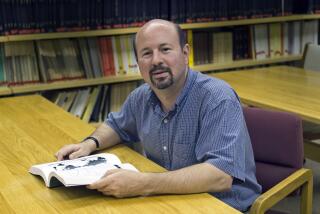And the 2011 awards for bad climate science goes to ...
The 2011 “Climate B.S. of the Year Award” goes to the entire field of candidates currently stumping in New Hampshire for the Republican Party presidential nomination, the Pacific Institute announced Thursday.
The awards, in their second year, are intended to distinguish the most active among so-called climate change deniers.
In this case, “B.S.” stands for bad science, according to hydroclimatologist Peter Gleick, president of the Pacific Institute and a member of the U.S. National Academy of Sciences.
“There’s a lot of very serious pushback in the scientific community about bad climate science being pushed by a small group of skeptics,” said Gleick from his office in Oakland. “There’s plenty of formal pushback in the literature. This was an attempt, really, to highlight some of the most egregious examples over the past year in a way that was a little more lighthearted.”
The Republicans seeking the White House won this year’s contest “hands down,” the institute’s announcement says: “Not a single one of the Republican candidates for president has a position on climate change that is consistent with the actual science accepted by 97-98% of all climate scientists and every national academy of sciences on the planet.”
The statement adds, “The choice among the current Republican candidates on the issue of climate change is scientific ignorance, disdain for science, blatant misrepresentation of facts, or naked political expediency.”
Runners-up for the award include Fox News and its parent company, Rupert Murdoch’s News Corp.; controversial climate scientists Roy Spencer and William Braswell, and fossil-fuel billionaires Charles and David Koch for funding studies by climate-change deniers and election campaigns by politicians share their views.
A paper by Spencer and Braswell in the journal Remote Sensing was roundly debunked by others in the climate science community, causing the editor, Wolfgang Wagner, to resign after acknowledging he should never have printed the paper. His resignation statement, highlighted in a post by Gleick, reads:
After having become aware of the situation, and studying the various pro and contra arguments, I agree with the critics of the paper. Therefore, I would like to take the responsibility for this editorial decision and, as a result, step down as editor-in-chief of the journal Remote Sensing. ... With this step I would also like to personally protest against how the authors and like-minded climate sceptics have much exaggerated the paper’s conclusions in public statements.
Winners of the award get … nothing.
“Oh, I’m not naive enough to think that the fear of getting this award will prevent bad science in the future,” Gleick said. “There’s a very serious industry devoted to misusing climate science in order to confuse the public and policy makers. But I do hope that the realization that they may be called out for it might give them pause.”
The nonprofit Pacific Institute’s stated aim is finding scientific and policy solutions to problems including water shortages, habitat destruction, global warming and environmental injustice.
RELATED:
Call safe-sex hotline, save endangered species
California wolf is named ‘Journey’; photo released
Sea Shepherd activists arrested filming cove dolphins






